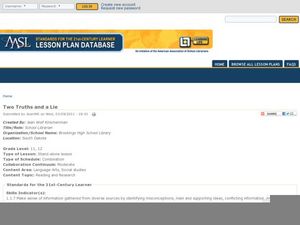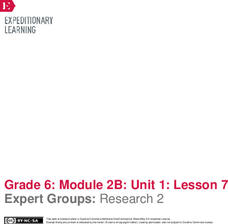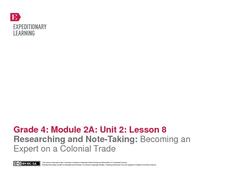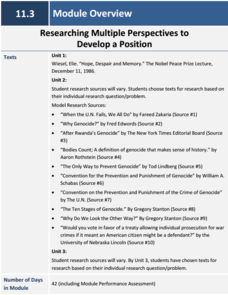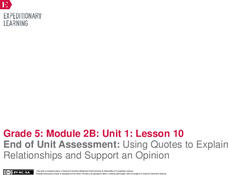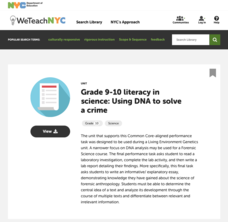Curated OER
Assessing Research Materials
Teaching learners how to evaluate a research source is an important part of the research process. The fresh idea here is that groups first develop a list of reasons why resources should be evaluated, transform these reasons into...
Curated OER
Two Truths and a Lie: Internet Research Skills
It's tough for high schoolers to assess what is a credible resource and what is not. A helpful resource prompts class members to research a particular topic and record two facts—and create one lie—while documenting the sources. They then...
Curated OER
Research Skills: Evaluating Information and Sources
While this focuses on Ancient Rome, the objectives are improved research and information evaluation skills. In one class period, class members narrow their topic, research it, select the best information, log useful sources, and discuss...
Crafting Freedom
Frances Ellen Watkins Harper: Lover of Literacy
This, the sixth in a series of 10 related resources, examines the life and works of Frances Ellen Watkins Harper, an African American author, born in 1825, who advocated literacy for both free and enslaved African Americans.
Core Knowledge Foundation
Third Grade Skills Unit 7: What’s in Our Universe?
Over four weeks, third graders participate in lessons that boost spelling, grammar, reading, and writing skills. Scholars explore spelling patterns, suffixes, singular and plural possessive nouns, quotations, and conjunctions....
Core Knowledge Foundation
Second Grade Skills Unit 6: The War of 1812
An English language arts unit closely examines spelling, grammar, reading, and writing skills. Scholars practice spelling patterns and tricky words. A read-aloud details the War of 1812 and introduces adverbs, and a close reading looks...
EngageNY
Applying Research Skills: “Rachel Carson: Environmentalist and Writer”
It's important to cite sources! Scholars take a closer look at their research about DDT by examining how to cite sources. Learners take turns sharing information that would be used to cite sources to complement Rachel Carson:...
EngageNY
Expert Groups: Research 2
Continue on. Scholars continue the research they began in their expert groups in activity six. They read text and task cards from their research folders and share what they have gathered in research thus far. Individuals then spend the...
EngageNY
Researching and Note-Taking: Becoming an Expert on a Colonial Trade
Fourth graders work in small groups to become experts on different colonial trades in the eighth instructional activity of this unit. Working toward the long-term goal of writing a piece of historical fiction, young scholars read...
EngageNY
End of Unit 2 Assessment: Working with Two Texts - Reading, Listening, Summarizing, and Synthesizing
As a summative assessment for this unit on colonial trade, fourth graders listen to and read informational texts in order to demonstrate their ability to take notes, write summaries, and draw connections. Young scholars first listen as...
Curated OER
Roman Holiday in Google Earth
Students plan an itinerary for an educational trip to Rome. In this research skills lesson, students use Google Earth to conduct research for their project in their travel teams. Students also set up blogs to share their progress through...
Dream of a Nation
Big6 Research Project
Do research projects at your school look like a class of eighth graders staring at a blank screen? Use the Big 6 research method to guide middle schoolers through the process of finding a topic, searching for and evaluating sources,...
Bantam Books
The Tempest: Fishbowl Discussion Strategy
Readers learn together with a group discussion activity. As they read William Shakespeare's The Tempest, high schoolers prepare for a fishbowl discussion in which three or four learners sit in the middle of a large circle and have a...
Curated OER
Gathering, Evaluating,and Organizing Information for a Research Report
It's never too early to build research skills! Students locate information relevant to a subject they are doing a research project on. They take notes and sort the information under main topic headings. Through research, they gain an...
EngageNY
Grade 11 ELA Module 3: Researching Multiple Perspectives to Develop a Position
The only way that a heinous act of genocide can succeed is if citizens of surrounding groups and countries turn their backs on those suffering. A thorough language arts module addresses shared central ideas with three separate units,...
Theodore Roosevelt Association
Interpreting the Past; Assessing Its Impact on the Present
Even though the presidency of Theodore Roosevelt ended over 100 years ago, we can still learn something from his stances and policies that is applicable today. Class members first look over a list of prevalent political issues from the...
EngageNY
Mid-Unit 3 Assessment, Part 2: Explaining How New Information Connects to the Topic
Let's talk it out. Using the resource, scholars work in triads to discuss how their research has deepened their understanding about sustainable fishing. Next, pupils engage in a whole-class discussion to consider their next steps toward...
ReadWriteThink
Promoting Student Self-Assessment
Keep class members accountable for their own learning with a series of differentiated instruction strategies. From rubrics created by pupils to learning contracts written at the beginning of the year, the resource offers multiple ways...
Curated OER
Writing Effective Thesis Statements and Introductory Paragraphs for Research Papers
After reading on the topic of their paper, high schoolers work in pairs to assess how to write powerful, precise thesis statements. The introduction contains three statements: a universal statement, a bridge statement, and a thesis...
EngageNY
End of Unit Assessment: Using Quotes to Explain Relationships and Support an Opinion
Think big! Scholars complete an end of unit assessment using their notes and graphic organizers along with the texts Big Thinkers: Was Steve Jobs This Generation’s Thomas Edison? and Steve
Jobs. To complete the assessment, they answer...
Curated OER
Crisis in Darfur
High school social studies teachers addressing the crisis in Darfur could use elements of this plan to increase social studies vocabulary and research skills. It includes a page of lecture/discussion notes, instructions for creating...
New York City Department of Education
Grade 9-10 Literacy in Science: Using DNA to Solve a Crime
Scholars become detectives and use science to solve a crime! A complete unit introduces DNA and includes hands-on activities that have learners model DNA and extract it from different food types. A culminating activity challenges...
Teacher Stream
Mastering Online Discussion Board Facilitation
Build a class community, allow time for in-depth reflection and research, and facilitate the learning and writing process with online discussion boards! A resource delves into the benefits and purposes of discussion boards, as well as...
Curated OER
CCC: Credible sources, Creative Commons Images, and Citing Your Sources
As part of a unit devoted to the study of autobiographies, this one-day library session focuses on developing research skills. Class members locate and properly cite a sketch of a Creative Commons image, as well as record the call...



